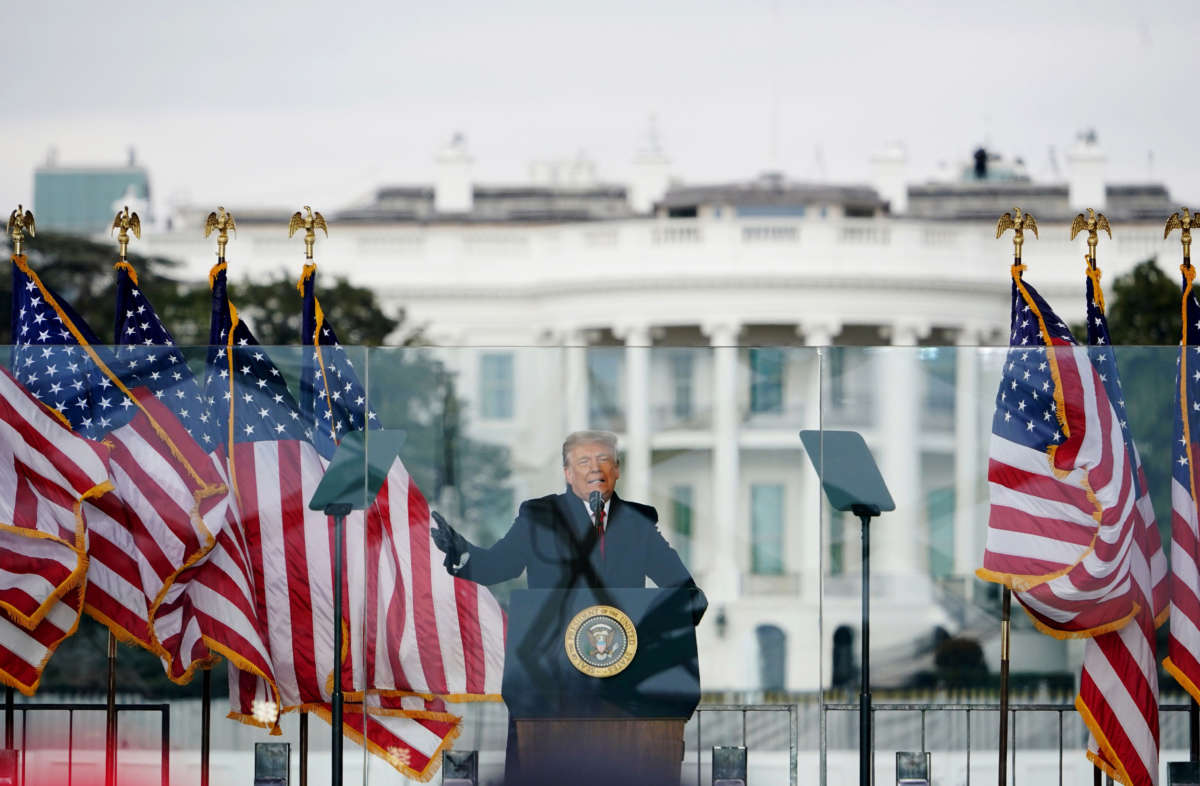Lawyers for former President Donald Trump have filed an emergency petition to the U.S. Supreme Court in an attempt to halt a lower court ruling issued earlier this month that would allow the House committee investigating the January 6 Capitol attack to view documents from Trump’s final weeks in office.
Earlier this year, the committee requested communications and other presidential records from January 6 and the days leading up to the violent breach of the Capitol. Trump attempted to block the transfer of records by asserting executive privilege rights, but President Joe Biden rejected Trump’s privilege claims in October, citing the terms of the Presidential Records Act.
Trump sued soon after, and has lost every court challenge and appeal since. Earlier this month, the Circuit Court of Appeals for the District of Columbia ruled against Trump’s privilege claims, but placed a two-week “administrative injunction” on the National Archives handing over the documents to allow Trump the opportunity to file an appeal to the Supreme Court.
Trump’s lawyers filed an appeal on Thursday — the day the injunction was set to be lifted — in an attempt to extend the stay beyond the two-week window.
At least four of the Court’s nine justices must agree to hear a case for it to move forward. If that threshold isn’t met, the stay will be lifted and the documents can be transferred to the January 6 commission.
Trump’s legal team is arguing that the D.C. Circuit Court’s ruling would set a dangerous precedent.
“Producing these privileged documents would irreparably harm the institution of the Presidency,” Trump’s legal team wrote, adding that presidents have an expectation that their communications with advisers “can be ‘candid, objective, and even blunt’ in [their] decisionmaking.”
“Waiving privilege in this instance will cause all future administrations to be wary of their confidential communications,” Trump’s lawyer continued. “It will be on the minds of all future Presidents that a successive administration of a rival political party could waive the privacy of their communications with ease. This will detrimentally impact Presidential decisionmaking for all future Presidents.”
Some experts have contended that this argument rests on questionable legal ground, particularly because Biden has determined that Trump’s claims about dangers posed to the institution of the presidency are meritless. The former president’s argument also lacks specificity, a point the D.C. District Court made clear in its early December ruling.
“Former President Trump has given this court no legal reason to cast aside President Biden’s assessment of the Executive Branch interests at stake, or to create a separation of powers conflict that [the president and Congress] have avoided,” the appellate court said.
In an op-ed for Bloomberg Law written shortly after the D.C. Circuit Court ruling, federal prosecutor Dennis Aftergut predicted that Trump would ultimately fail at preventing the commission from viewing his presidential records.
“Trump offered no evidence demonstrating that his views outweighed those of the current president, or that disclosure of any specific document would cause irreparable damage to the presidency,” Aftergut wrote.
Other legal experts said that it would be inexcusable for the Supreme Court to hear Trump’s case because the premise of his emergency filing was so flawed.
“A good way for SCOTUS to reassure the public if it’s [sic] independence & integrity would be to promptly deny Trump’s request to prevent release of his records to the 1.6 Comm, because it’s plainly without merit,” said Joyce Alene, a former federal prosecutor and current law professor at the University of Alabama.
Laurence Tribe, Professor Emeritus at Harvard University, implied in a Twitter post that if the Supreme Court agreed to grant a hearing to the case, it would be due solely to the fact that Trump appointed three of its justices during his four years in office.
“If it expects to be respected as a court rather than a black-robed extension of the Trump cult, the Supreme Court will promptly reject this legally groundless request,” Tribe said.
Our most important fundraising appeal of the year
December is the most critical time of year for Truthout, because our nonprofit news is funded almost entirely by individual donations from readers like you. So before you navigate away, we ask that you take just a second to support Truthout with a tax-deductible donation.
This year is a little different. We are up against a far-reaching, wide-scale attack on press freedom coming from the Trump administration. 2025 was a year of frightening censorship, news industry corporate consolidation, and worsening financial conditions for progressive nonprofits across the board.
We can only resist Trump’s agenda by cultivating a strong base of support. The right-wing mediasphere is funded comfortably by billionaire owners and venture capitalist philanthropists. At Truthout, we have you.
We’ve set an ambitious target for our year-end campaign — a goal of $250,000 to keep up our fight against authoritarianism in 2026. Please take a meaningful action in this fight: make a one-time or monthly donation to Truthout before December 31. If you have the means, please dig deep.
